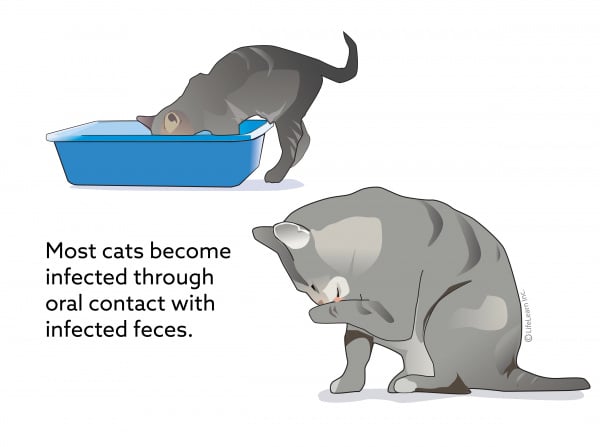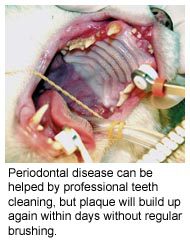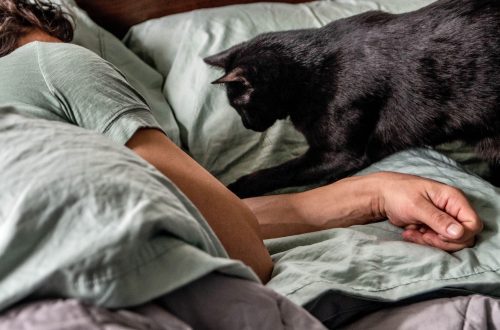
Coronavirus enteritis and viral peritonitis in cats
Coronavirus infections are quite common among domestic cats. They are species-specific – they are easily transmitted from cat to cat, but they are not dangerous for humans and other pets. For cats, however, this infection can be very dangerous.
Contents
The causative agent is the enteric coronavirus (feline enteric coronavirus, FECV). Most often, cats become infected through contact with feces and saliva, household items, bowls, toys, a tray of a sick animal or carrier. Newborn kittens can get the virus from their mother’s milk and by licking, and almost always die. In addition, the wearer may bring the infection home on shoes or clothing. Kittens and young cats under the age of 1-2 years, and older ones over 10-12 years old are more likely to get coronavirus enteritis. Once in the cat’s digestive system, the virus begins to actively multiply, affecting the intestinal epithelium. Because of this, inflammation occurs, malabsorption of substances. In well-immune cats, the virus may progress rapidly with signs of gastrointestinal distress or may be asymptomatic. Coronavirus remains in the body for a long time after the symptoms disappear, the animal becomes a virus carrier and can infect other animals. Sometimes it happens that the animal spontaneously recovers and the virus disappears from the body without a trace.
Viral peritonitis of cats (felineinfectious peritonitis virus, FIPV)
With weak immunity, exposure to adverse factors, the pathogen can mutate into the feline infectious peritonitis virus (FIPV). But this disease is already a mortal danger for a cat. The transition from coronavirus enteritis to viral peritonitis occurs in about 10% of cases. Left untreated, stressed, feline immunodeficiency virus, and feline viral leukemia, the coronavirus can mutate into FIPV, causing infectious peritonitis. Particles of the pathogen enter the circulatory system, infect macrophages – cells of the immune system, and spread throughout the body. Infectious peritonitis can occur in two forms – dry and wet.
- The wet (effusion) form is characterized by the accumulation of free fluid, which normally should not be, in the chest or abdominal cavities, structural changes occur in the organs. The liver, spleen, lymph nodes may increase. Breathing is disturbed with a large amount of effusion in the cavities.
- In the dry form, granulomatous nodules appear in the abdominal organs, there is no effusion. The dry form is difficult to diagnose.
The wet form is more common, while the dry form may change into the wet form as the disease progresses. Mortality is almost 100%.
Symptoms in different forms
Symptoms of coronavirus enteritis are not specific, it must be distinguished from panleukopenia, inflammatory bowel disease, poisoning, helminthiasis, etc. With coronavirus enteritis:
- Lethargy, oppression
- Refusal of food
- Vomiting
- Diarrhea, blood and mucus in the stool
In case of infectious peritoneum:
- Fever, intermittent fever
- Heavy rapid breathing
- Lethargy
- Edema of the extremities
- Decreased appetite
- Digestive disorders
- Bloated life due to ascites
- Anemia
- Severe depletion of the body
- Wool deterioration
- Jaundice
- Uveit
- Multiple organ failure
Diagnostics
Since there are a lot of symptoms, they are not specific and of varying severity, then, of course, examinations cannot be dispensed with. With enteritis of unclear etiology, you will need to take blood tests, take swabs or feces for coronavirus, panleukopenia, toxoplasmosis, exclude giardiasis and helminthiases. Ultrasound is an important research method for both dry and effusion forms. It helps to see structural changes in organs, their enlargement, the presence of nodules and free fluid. If the latter is present, the cavity is punctured with a fine needle to collect effusion to examine the cellular composition and evaluate for mutated FECV. Blood is also tested by PCR. There is also an immunohistochemical definition of the virus, but for this it is necessary to take the tissues of the affected organs, which is quite problematic, especially if the animal is in serious condition.
Prognosis and treatment
With intestinal coronovirus, the prognosis is favorable to cautious. In the intestinal form of FECV coronovirus, enterosorbents, antibiotics, a special easily digestible diet to support digestion, as methods of non-specific therapy, are needed. With the development of infectious peritonitis, the prognosis is unfavorable. It is also sometimes possible to maintain the quality of life with the help of immunosuppressive therapy, only under the supervision of the attending physician. With the accumulation of a large amount of effusion, it is diverted to facilitate breathing. With the development of anemia, a blood transfusion is performed.
Prevention
Prevention, as in the case of other infections, is to comply with sanitary and hygienic standards, especially for nurseries, zoo hotels, overexposure. New cats must be quarantined, to prevent mating with untested cats. There is no vaccine for feline coronavirus. If a patient or carrier is found in the population, they are isolated, and everyone else must be checked for the presence of coronavirus. With three negative results with an interval of a month, the animals are considered healthy.





